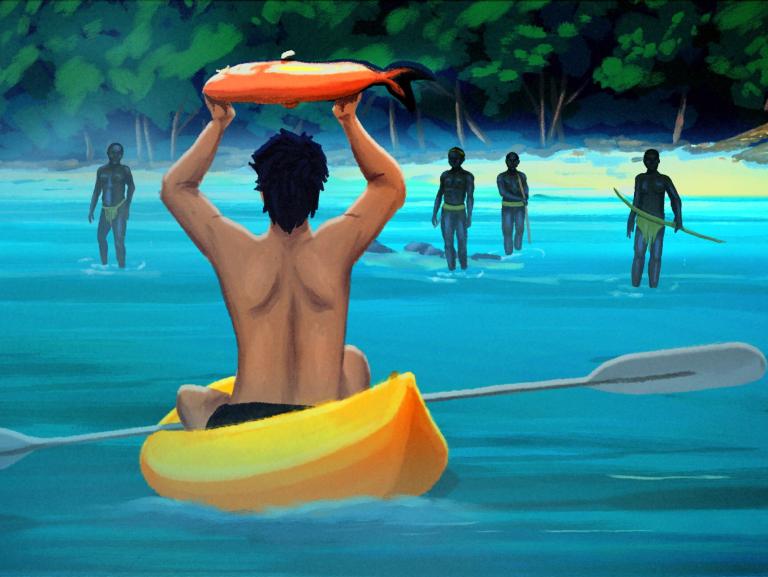
The Mission, streaming on Hulu and Disney+, documents the life and death of Christian missionary John Allen Chau, against the backdrop of a 21st Century world where opinions on evangelization have radically changed.
Reprinted with permission from the Family Theater Blog.
The Tragic Story of John Allen Chau
Already attracted to outdoor adventure and the desire to bring Christ to places where He is not known, the idealistic, driven Chau set himself to contact the isolated inhabitants of North Sentinel Island, part of an Indian archipelago in the Bay of Bengal.
The Sentinelese have long strenuously (and often violently) resisted any outside contact. That prohibition is now enshrined in Indian law — at least in part to protect the islanders from outside diseases to which they have no immunity.
But, in 2018, the 26-year-old Chau decided to approach the island anyway. Despite a warning arrow shot to his waterproof Bible, he returned — and apparently paid with his life for the attempt. His body has never been recovered.
The Film of Chau’s Mission
Created by directors Amanda McBaine and Jesse Moss (Boys State), The Mission chronicles Chau’s life and faith, and reconstructs his fatal journey through letters and diary entries, photos, video, and animation.
Interviewees include Chau’s friends, and his father — who advised against going and didn’t approve of the direction of his son’s faith — and others commenting on faith, evangelization, and isolated cultures, including a former missionary whose efforts cost him his own belief.
Take a look:
The result is an insightful and largely even-handed portrayal of who and what drove Chau to undertake his ill-fated effort. While many reviews of the film saw Chau as a fool, a villain, or both, IndieWire gave perhaps the most balanced assessment:
The first half of “The Mission” is triumphant, offering a multitude of thought-provoking ways to approach a tragedy. But with so many fascinating angles at their disposal, it’s unfortunate that Moss and McBaine didn’t take a bigger swing with their ending. Rather than exploring the tension between Chau’s intrinsic yearning for religion and a secular nation that offers few healthy avenues to scratch that itch, the film reaches the disappointingly narrow conclusion that religion itself is the problem. Quotes about churchgoers living by “first century myths” in the 21st century feel more appropriate for a cringe-inducing Reddit thread than a documentary that goes to such great lengths to humanize its subject.
It misses the point that the film otherwise makes so well: Chau’s story is about much more than religion and mission trips. The real lesson to be learned is the need for adults to realize that life is more than a storybook with ourselves as the hero.
What a Catholic Priest Thinks of The Mission
To get a priest’s perspective, I turned to Holy Cross Father Vince Kuna, C.S.C., a producer-at-large at FTP. Here’s how he answered my questions:
What was your initial reaction to what happened to John Chau, and did watching the documentary change your thoughts on the events — or the reaction to them?
When I originally heard the news, I thought what he had done was a bit foolhardy. I’m more ashamed to say that I found out about his fate through an uncharitable meme on Facebook. The documentary brought his life back from caricature to learning about a mature, faithful, young Christian.
What do you think of how the documentarians handled the story, and did the film work for you?
I found the documentary to be the fairest non-fiction story streaming anywhere. I think secular audiences can have their smugness and their perceived settled atheism challenged, and I think religious audiences will be challenged in thinking more deeply about mission work and what it means to be martyred for the Faith.
Of the interviewees, which one(s) stood out to you?
The professor and former missionary, who now no longer considers himself Christian, gave the most credible interview, contextualizing modern missionaries and martyrdoms from his past life of overseas ministry, while also providing criticism and caution from his current work as an academic and former Christian.
Whatever one thinks about evangelization, the threat of disease (understood much better today than it was in centuries past) to isolated islanders is a real one. How does that factor into wanting to acquaint isolated people with Christianity?
Yes, that’s important to understand the historical context. When Iberian Catholics met indigenous peoples, little was known about germs and immunities. Today, we obviously know much more. I would say Christians should proceed with extreme caution to protect isolated persons.
However, the threat of disease does not completely preclude us from our task of evangelization. Anyone, Christian or otherwise, could walk out their door and catch something terminal (or unknowingly pass along something terminal). We shouldn’t live in constant fear of dying, or else we would never leave our homes, let alone spread the Gospel to unknown persons.
If Chau had come to you with his desire to go to Sentinel Island, what do you think you might have said to him?
Simply, “Go with God, brother.” But that’s just me.
In conclusion, explain what the Great Commission means today in the Catholic Church, and how that might differ from the way the documentary explains Chau’s Evangelical beliefs.
It means proclaiming the fullness of the Gospel to all peoples, without equivocation for certain groups and/or demographics of peoples. I felt there wasn’t that much of a difference between the Catholic approach to the Great Commission and John Chau’s faith.
So that I don’t end this interview in theological abstractions, let’s just say the documentary reminded me of a Holy Cross priest brother of mine assigned to one of our provinces in India.
As a dynamic, well-educated young priest spreading the Gospel in the subcontinent, he received a bullet in his eye from Hindu nationals, in an attempted assassination for his efforts. What did he do after? Shake the dust off his feet and get right back at spreading the Gospel in the subcontinent of India.
John Chau’s story reminded me almost exactly of my own religious brother’s heroic story.
Image: John Chau in The Mission. PHOTO: Courtesy of National Geographic
Don’t miss a thing: Subscribe to all that I write at Authory.com/KateOHare
Click here to visit USC-film-school graduate Father Vince Kuna’s IMDB page.













